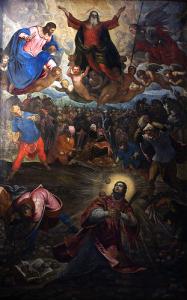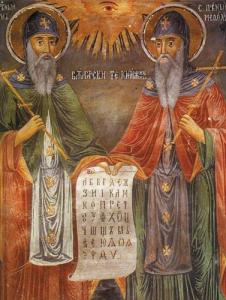This is the final post in a short series on the book of Acts, was written by a Christian colleague (JAG) who teaches in the School of Social Work. Both his professional expertise and his personal experience as a second generation immigrant shape his understanding of the book and bring insights that will help all of us read the book better. He presented the material in a well received class at our church. Today he wraps up answering some questions that have been raised in comments. RJS
These posts were my first attempts at blogging. After the fact I realized that, unlike teaching in Sunday school or the college classroom, this blog’s conventions allows fewer opportunities for dialogue. And so, to clarify: My over-arching point, not original to me, is Rah’s notion of Triple Consciousness – second generation immigrants have an ability to “code-switch” languages and cultural frames of reference.
My personal stories at the start of each lesson, especially in person, are meant to reinforce Rah, as well as align with Social Work’s “Professional Use of Self” (at times in Sunday school, this led to the icebreaker taking longer than expected). Extending Rah’s notion, this ability to move between cultures and languages is not exclusive to children of immigrants. I have had Third Culture Kids in my classes: Their experiences and that literature indicates similar competencies. However, these skills are not innate and can be developed. Note in Acts 6, that in the entirely Jewish church, the Seven Deacons, all Jewish men, appear to code-switch between Hebrew and Greek, presumably language and culture, in order to serve the widows, identified in the text as “Hellenistic Jews.”
 Stephen, whose name is listed first among the deacons, is martyred at the end of Acts 7. I find Rah’s notion to be a helpful framework in interpreting the subsequent chapters, as those associated with Stephen, especially Philip and Paul, are scattered and minister to increasingly diverse populations.
Stephen, whose name is listed first among the deacons, is martyred at the end of Acts 7. I find Rah’s notion to be a helpful framework in interpreting the subsequent chapters, as those associated with Stephen, especially Philip and Paul, are scattered and minister to increasingly diverse populations.
One comment asked if “fresh off the boat” was pejorative. Unpacking this phrase, I hope, will be a useful way to help us think more deeply about code-switching, languages and cultural frames of reference. Context matters. Is the speaker a gourmet using the phrase to describe the dinner menu at a seafood restaurant or an immigration officer interrogating human border-crossers who may or may not have documentation? In addition to any pre-existing power dynamics between groups, it is also important to have some idea of how the phrase is understood by the group the phrase is purported to describe. Often there is a historical element to in-group usage: The cultural meanings of “gay” and “queer”, for example, have shifted over time.
In another “Professional Use of Self,” let me now make this discussion Filipino-specific. Immigration from the Philippines to the US begins in earnest after the Spanish-American War. Filipinos have the status of US Nationals and are allowed to cross the countries’ borders in relative freedom. This so-called “first wave” of immigrants, which included my father, referred to themselves as “Pinoy,” an informal demonym – take the last part of “Filipino” then add “oy” or “ay” depending on gender (most sources note this “wave” is overwhelmingly male). Probably the best-known example of this common practice is the assassinated political rival of former President Marcos, ex-Senator Benigno Aquino, usually referred to by his nickname, “Ninoy.”
However, “Pinoy” was appropriated by non-Filipinos and used as a pejorative. This coincided with the burgeoning roots of the first America First rhetoric – alongside the re-birth of the Ku Klux Klan, strict immigration quotas, and a series of anti-miscegenation laws outlawing marriages between Filipino men and white women in multiple states. (My survey of race relations, pre-World War II, is selective but obviously could also include jim crow, lynching and riots – the latter of which also targeted Filipinos, notably in Watsonville, CA).
In the 1960s and 1970s “Pinoy” and “Pinay” were reclaimed by student activists and cultural artists. What was once pejorative became a badge of honor, a reconnection to the past, and a tribute to the struggles and resilience of the previous generations. Black Power, Brown Power, Pinoy Power! Today the term is much more in the mainstream and can refer to all people of Filipino descent, both in the US and also in the Philippines.
The previous example, I think, also sheds some light on the comments regarding Paul in Athens (Acts 17:24) and my use of Romans 1:20. When communicating with people from different backgrounds, context matters. The power dynamics matter. History matters. And relationship matters. No, the entire gospel message is not encapsulated in Romans 1:20. And as noted in the comments, some rough ideas about God do exist in other ancient cultures – which I why I also cited Ovid.
These rough ideas however, can be a starting point for a dialogue – which could become ongoing and perhaps even lead to saving faith. But for Pike’s Redemptive Analogies to have any traction, there needs to be some commonality. And for the Christian, this means some willingness to see the world as the other person does, to learn the language of another’s heart – and not always metaphorically.
My description of Kenneth Pike demonstrating Redemptive Analogies to my undergraduate Christian fellowship is really an application of his Emic/Etic Distinction. From a Social Work perspective, Pike’s groundbreaking concepts in Linguistics can also be seen as a macro strategy for evangelism.
In the 9th century, both the Catholic and Orthodox churches sent missionaries to the Slavic people groups. While I don’t want to ignore the political tug-of-war at the time between Rome and Constantinople, I do want to emphasize differences in macro strategy the respective churches employed as they engaged the Slavs. The Catholic missionaries insisted on maintaining their liturgy – in Latin. Therefore the Slavs, to fully understand the faith and the language of their teachers, would also need to understand Latin.
 Contrast this with the success of the Orthodox missionaries, Cyril and Methodius. These two brothers not only learned the to speak to the Slavic peoples in their own language but also translated the Bible, enabling the Slavs to search the scriptures themselves – and even developed the Cyrillic Alphabet, which today is still the written basis for that family of languages. Renowned in the Orthodox church, Cyril and Methodius are hailed as “The Apostles to the Slavs.”
Contrast this with the success of the Orthodox missionaries, Cyril and Methodius. These two brothers not only learned the to speak to the Slavic peoples in their own language but also translated the Bible, enabling the Slavs to search the scriptures themselves – and even developed the Cyrillic Alphabet, which today is still the written basis for that family of languages. Renowned in the Orthodox church, Cyril and Methodius are hailed as “The Apostles to the Slavs.”
Preserving the spoken word as written text for me harkens back to my visit with a former student on the mission field in the Philippines. What I didn’t say in my last blogpost was that he was the last in several generations of missionaries to what is now a church with indigenous leadership. I also didn’t say the previously unreached people group resides on the island of Mindanao, at times seen by US Presidents as a stronghold of Islamic terrorists. In fact, the first “missionaries” to make contact with the Tagakaulo people were not Christian but rather Muslim.
My former student recounts that when asked if they wanted to convert to Islam, the tribal elders answered the question with a question: Do we have to give up eating pork? We are pig farmers. What are the Tagakaulo without pigs? At that point the Muslims departed, apparently reckoning that because the villages were so remote, any efforts at mass conversions would be more trouble than it was worth.
To conclude, a counterpoint to my discussion of Triple Consciousness, throughout Acts and especially in 15:1 is:
Certain people came down from Judea to Antioch and were teaching the believers: “Unless you are circumcised, according to the custom taught by Moses, you cannot be saved.”
To paraphrase the response: In the first century, no! Believers did not need to be Jewish first, before becoming Christians. In the ninth century, no! Believers did not need to learn Latin first, before becoming Christians. In the 21st century, no! Believers do not need to forsake pig-farming first, before becoming Christians. Paul’s words in Ephesians 2:8-9 are emphatic:
For by grace you have been saved through faith, and this is not your own doing; it is the gift of God—not the result of works, so that no one may boast.
If you would like to contact me directly you may do so at rjs4mail[at]att.net.
If interested you can subscribe to a full text feed of my posts at Musings on Science and Theology.











